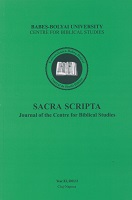MARRIAGE AND DIVORCE: THE PHARISEES AND JESUS IN THE LIGHT OF EARLY RABBINIC LITERATURE
MARRIAGE AND DIVORCE: THE PHARISEES AND JESUS IN THE LIGHT OF EARLY RABBINIC LITERATURE
Author(s): Reinhard NEUDECKERSubject(s): Christian Theology and Religion
Published by: Universitatea Babes-Bolyai - Centrul de Studii Biblice
Keywords: Marriage; Divorce; Rabbinic Literature; Antithesis; Pharisee; Adultery
Summary/Abstract: The teaching of Jesus on marriage and divorce is particularly clear in the gospel of Matthew. Matthew deals with this theme in connection with the Decalogue commandment “You shall not commit adultery” (Exod 20:14). The logion of Jesus on divorce appears as a doublet in Matt 5:32 within Matthew’s so-called antitheses and in Matt 19:9 within its original context, which presents also Jesus’ view of marriage. In both places Jesus’ teaching challenges that of the Scribes and Pharisees. Matthew does not spell out the positions of the Scribes and Pharisees in greater detail. He limits himself to abbreviations and mere hints, which makes it necessary to look for fuller background information.The standpoint of the Scribes and Pharisees that Matthew, particularly in his antitheses, chooses to indicate moves to a great extent on the level of legal exegesis and practical (juridical) justice. This standpoint is challenged by Jesus’ teaching which, however, is on a moral level and which presents a spirituality for the perfect: “You must be perfect, as your heavenly Father is perfect” (Matt 5:48). On the level of justice that can be put into practice in a society of ordinary people who do break the commandments, Jesus may well have approved a good number of the Scribal and Pharisaic rules and regulations as being made “for the hardness of the human heart” (cf. Matt 19:8). In fact, in Matt 23:2-3 Jesus calls upon his followers to do and observe everything the Scribes and Pharisees tell them, because they “sit on Moses’ seat”. Here it is agreed that in principle they are the heirs of Moses and that their teaching, in spite of Jesus’ criticism, merits attention.
Journal: Sacra Scripta
- Issue Year: XI/2013
- Issue No: 2
- Page Range: 262-286
- Page Count: 25
- Language: English
- Content File-PDF

